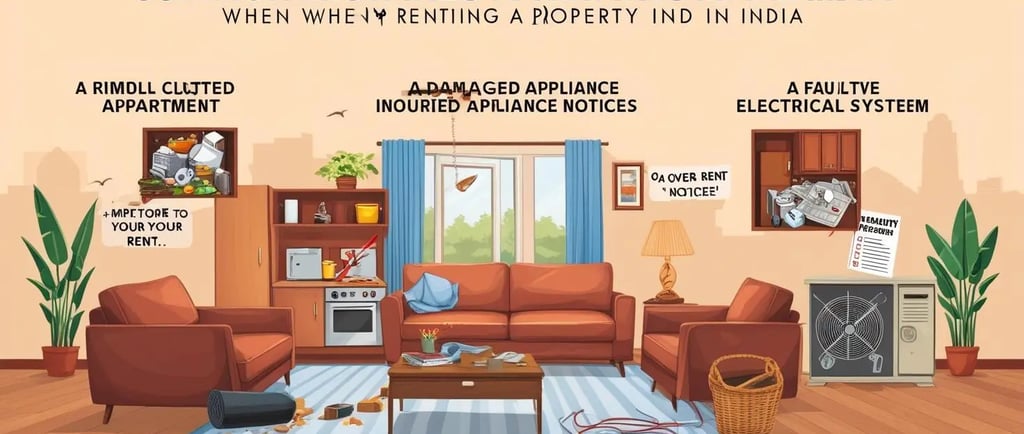Mistakes Tenants Should Avoid When Renting a Property in India
Avoid rental pitfalls in India! Learn key mistakes tenants make—hidden charges, legal traps & bad deals—so you can rent smart & stress-free.
Archita
2/10/20254 min read


Renting a home in India can be exciting—new beginnings, fresh surroundings, and the comfort of your space. However, the process is riddled with potential pitfalls that many tenants, especially first-timers, overlook. From ignoring the fine print in agreements to skipping background checks on landlords, a slight misstep can lead to financial loss and legal hassles.
To ensure a smooth rental experience, let's examine tenants' common mistakes and how to avoid them.
1. Not Reading the Rental Agreement Carefully
One of the tenants' most significant mistakes is signing the rental agreement without thoroughly reading it. A rental agreement is legally binding; any overlooked clause can create substantial issues later.
👉 Key things to check in the rental agreement:
✅ Duration of the lease (11 months or longer?)
✅ Notice period for vacating
✅ Rent escalation clause (by how much and when?)
✅ Security deposit amount and refund terms
✅ Maintenance responsibilities (who pays for repairs?)
Unexpected rent hikes are a common problem many tenants face. "My landlord increased the rent by 20% after just six months, claiming it was in the contract," says Rishi, a tenant from Bengaluru. I had no choice but to move out because I didn't read the fine print."
Pro tip: Always read and understand the agreement before signing. If needed, consult a lawyer.
2. Not Negotiating Rent and Other Charges
Many tenants assume that the rent mentioned by the landlord is final. But in reality, rent is often negotiable. Landlords expect negotiations, and you could save thousands just by asking.
For example, In Mumbai, the average rent for a 1BHK in Bandra is ₹50,000 per month, but many tenants successfully negotiate a 5-10% reduction.
🚀 How to negotiate smartly?
Research market rates in the area
Offer a higher security deposit in exchange for a lower rent
Agree to a longer lease term (e.g., two years instead of one)
"Landlords often prefer stable tenants who stay longer," says property consultant Aakash Verma. "If you commit to a two-year lease, you might get a better deal."
3. Ignoring the Condition of the Property Before Moving In
It's common for tenants to move in without thoroughly inspecting the property. This can lead to disputes over damages later.
🔍 Before moving in, check for:
✔️ Leakages in bathrooms and ceilings
✔️ Functioning electrical appliances and switches
✔️ Pest infestation signs (termites, cockroaches, etc.)
✔️ Proper locking mechanisms on doors and windows
A tenant in Pune, Priya, shared her horror story: "We moved into a flat and discovered water seepage in the walls after two months. The landlord refused to fix it, claiming it wasn't there when we moved in."
Pro tip: Document everything before moving in. Take photos and videos and share them with the landlord.
4. Paying an Excessive Security Deposit
In cities like Mumbai and Bengaluru, landlords often demand huge security deposits—sometimes as high as 10 months' rent. But did you know that in Karnataka, the law states landlords cannot ask for more than two months' rent as a security deposit?
💰 Recommended security deposit ranges in major Indian cities:
Bengaluru: 2 months (legally capped)
Mumbai & Delhi: 3-6 months
Pune & Chennai: 2-5 months
🚨 How to protect yourself?
Insist on a reasonable deposit
Get a written receipt for the deposit
Ensure refund conditions are clearly mentioned in the rental agreement.
5. Not Verifying the Landlord and Property Ownership
Believe it or not, fake landlords exist! Some tenants pay deposits and rent to fraudsters who don't even own the property.
How do you verify ownership?
✅ Ask for a copy of the property's title deed
✅ Check the electricity/water bill (should be in the landlord's name)
✅ Speak to neighbors to confirm ownership
A recent case in Hyderabad involved a scam where a fraudster rented out a property he didn't own and disappeared with a security deposit of ₹2 lakhs from multiple tenants!
Moral of the story: Always verify ownership before making payments.
6. Overlooking Maintenance and Utility Costs
Many tenants assume that maintenance charges are included in the rent—only to receive surprise bills later.
📌 Before signing the lease, clarify:
Who pays for society maintenance charges? (Tenant or landlord?)
Is water included in the rent?
Who will handle minor repairs like plumbing issues?
A tenant from Noida recalls, "I signed a rental agreement without checking the maintenance terms. Later, I was shocked to receive a ₹5,000 monthly bill from the society."
Lesson: Always ask for a breakdown of expenses before renting.
7. Not Getting Rent Receipts
Many landlords refuse to provide rent receipts, which can create problems later, especially if you claim House Rent Allowance (HRA) exemption in your tax filing.
💡 How to ensure you get receipts?
Politely request digital receipts via UPI payments
If paying in cash, get a handwritten signed receipt
Mention receipt issuance in the rental agreement
Without rent receipts, you could miss out on tax benefits worth thousands!
8. Failing to Give Proper Notice Before Leaving
Most agreements require a one to three-month notice period before vacating. If you fail to inform the landlord, you might lose your deposit.
🔔 Avoid this mistake by:
Checking the notice period clause before signing the lease
Sending a written notice (email or registered post)
Keeping proof of notice submission
A Gurgaon tenant shared, "I vacated my flat without a notice period, assuming I'd get my full deposit back. My landlord deducted two months' rent as a penalty!"
9. Not Checking the Neighborhood and Commute Options
Many tenants focus only on the flat and ignore the surroundings. A beautiful apartment in an inconvenient location can ruin your experience.
🚗 Things to check before renting:
✔️ Distance to your office/school
✔️ Availability of public transport, metro, autos
✔️ Safety of the locality (especially for women)
✔️ Proximity to grocery stores, hospitals, and banks
Example: A bachelor rented a flat in Noida at a great price but later realized the nearest grocery store was 2 km away and public transport was scarce. "I ended up spending more on cabs than I saved on rent," he says.
10. Trusting Verbal Promises Instead of Written Agreements
Many landlords make verbal commitments—like promising a free parking spot or no rent hike—but later back down on their word.
📌 Golden rule: If it's not in writing, it doesn't exist!
"Always document everything ."Even a simple email confirmation can help in case of disputes."
Final Thoughts
Renting a home in India comes with challenges, but you can avoid unnecessary stress by being aware of these common mistakes.
🔑 Key takeaways for a smooth rental experience:
✔️ Read the rental agreement carefully before signing
✔️ Negotiate rent and security deposits
✔️ Inspect the property and document issues
✔️ Verify the landlord and property ownership
✔️ Always get rent receipts and clarify all costs
A little caution and smart decision-making can make renting smooth and hassle-free. Happy house hunting!
Housing India
Your source for housing insights in India.
© 2025. All rights reserved.
